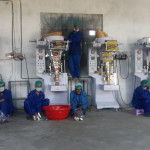
Each time a case of sesame seeds left the Barakat Bazr factory in Herat, Masood* knew that it was a lost opportunity. The seeds were sold unprepared, making them 40 percent cheaper at just $1,350 per metric ton.
Imports of expensive, high-tech equipment and large boxes of pre-paid phone cards by Afghanistan’s five major telecommunications companies account for half of all customs duties collected at Hamid Karzai International Airport in Kabul. Until recently, paying duties on those imports presented a huge security risk.
When 21-year-old Mokhtar Muhibi of Kabul began work as an unskilled plumber in 2010, the married father of two was scraping by on about $200 a month. He needed to improve his skills to support his family, which includes a younger brother still in school as well as his unemployed mother and father.

Before the Sail Food Co. started to produce and sell Afghanistan’s favorite puffed potato snack, kurkure, in 2010, the snack was imported from Pakistan. But the company’s owner, Sherin Jan, knew there was potential for growth and expansion to other products.

When Mohammad Saber and Mohammad Asif started Zarnegar, a printing press in Mazari Sharif, it was boom time in the capital of northern Afghanistan’s Balkh province. It was 1999 and Mazari Sharif was rapidly becoming one of Afghanistan’s more important economic hubs. Posters and billboards dotted the city, proof of a flourishing advertising industry.








Comment
Make a general inquiry or suggest an improvement.